Nord Stream 2, the almost-finished pipeline running directly from Russia to Germany, is not really about securing cheap natural gas. It is about personal gain and these two countries’ national interest.
The pipeline across the Baltic has pitted the United States and the European Union against Germany, and a swelling chorus of domestic critics against German Chancellor Angela Merkel. If it were just a matter of gas molecules, the project might never have seen the light of day. So, why did it?
Go back to 2005, when Gerhard Schroeder and Russian President Vladimir Putin sealed the deal just before Schroeder stepped down as chancellor. Shortly after handing power over to Merkel, the Russian energy giant Gazprom, essentially a Kremlin affiliate, named Schroeder chairman of Nord Stream AG’s shareholders committee. In 2016, Schroeder rose to the top of Nord Stream 2, with Gazprom the only shareholder.


















With your current subscription plan you can comment on stories. However, before writing your first comment, please create a display name in the Profile section of your subscriber account page.